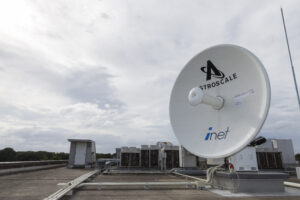Astroscale breaking new ground for on-orbit servicing demonstration
By Jason Rainbow

TAMPA, Fla. — Astroscale is joining forces with four satellite ground station providers to deliver the level of connectivity it needs for the world’s first commercial debris removal demonstration this year.
The Tokyo-based startup plans to use 16 ground stations in total to support its End of Life Services by Astroscale-demonstration (ELSA-d) mission, which comprises a 175-kilogram servicer spacecraft and a 17-kilogram client satellite that will act as a piece of debris.
After both spacecraft were launched March 22 to low Earth orbit (LEO), further testing to prepare for the debris removal demonstrations has pushed out plans to start maneuvers by two months to the end of July.
“ELSA-d will be a milestone moment in space engineering as we demonstrate the world’s first commercial debris removal mission; ground segment is one of these critical capabilities that is instrumental to our mission success,” said Astroscale Chief Engineer Gene Fujii.
Each spacecraft requires a dedicated mission control system, operated by Astroscale from the In-Orbit Servicing Control Centre (IOCC) at Harwell Campus, U.K.
For the servicer to perform complex maneuvers that include capturing the client with a magnetic docking plate — in both tumbling and non-tumbling scenarios — the control system via ground stations must be in constant contact with the spacecraft for up to 20-30 minutes.
That is up to three or four times longer than control centers typically need to connect with LEO satellites for health and status monitoring, according to Astroscale.
Using more ground stations in more parts of the world helps deliver these extended periods of contact.
Joining Astroscale’s ground station in Totsuka, Japan, are sites from U.S.-based Atlas Space Operations and Viasat, Kongsberg Satellite Services (KSAT) of Norway and Sweden’s Swedish Space Corporation (SSC).
The 16 ground stations are spread across 12 countries in total, compared with one or two ground stations used in a typical LEO mission.
“A typical mission uses ground stations in the poles to maximize download contact times,” said Alberto Fernandez, head of ground systems engineering for Astroscale’s U.K. subsidiary.
“We had to carefully select the ground stations and providers to maximize the duration of the constant contacts. Stations were selected following the ground track of the spacecraft in addition to the poles.”
SSC is preparing antenna stations in Western Australia, Sweden, Canada, Thailand and two in Chile.
“It is crucial that the overlapping partner stations deliver seamlessly,” SSC project manager Brian Priar said.
“Just like the mission itself, the ground segment solution is truly breaking new territory for modern space missions.”
Viasat said it is drawing on ground stations across North and South America, Europe, Africa and Australia to meet the mission’s high-revisit requirements from the poles to mid-latitude stations, while Atlas is readying services from two sites in the United States.
KSAT is providing the polar ground stations in the Arctic and Antarctica, in addition to other sites in its interoperable global network, with the intention that this scalable model will lead to new approaches for ground segment operations in the future.
Astroscale said the large ground station alliance is also vital for supporting camera technology that ELSA-d will use for the mission, facilitating real-time, on-ground data processing tasks.
However, the alliance has also posed challenges for the startup, which has had to conduct frequency coordination discussions in each of the 10 countries where it will use ground stations.
It said ELSA-d’s technology, policy and sustainability goals helped push the venture through these negotiations, building a foundation for future collaborations with governments and legislative institutions.
“Astroscale’s network of ground station providers will be critical to our commercial on-orbit servicing services for the future,” said John Auburn, Astroscale group chief commercial officer and managing director of its U.K. business.
June 29, 2021 at 04:28PM
via SpaceNews read more...

Post a Comment